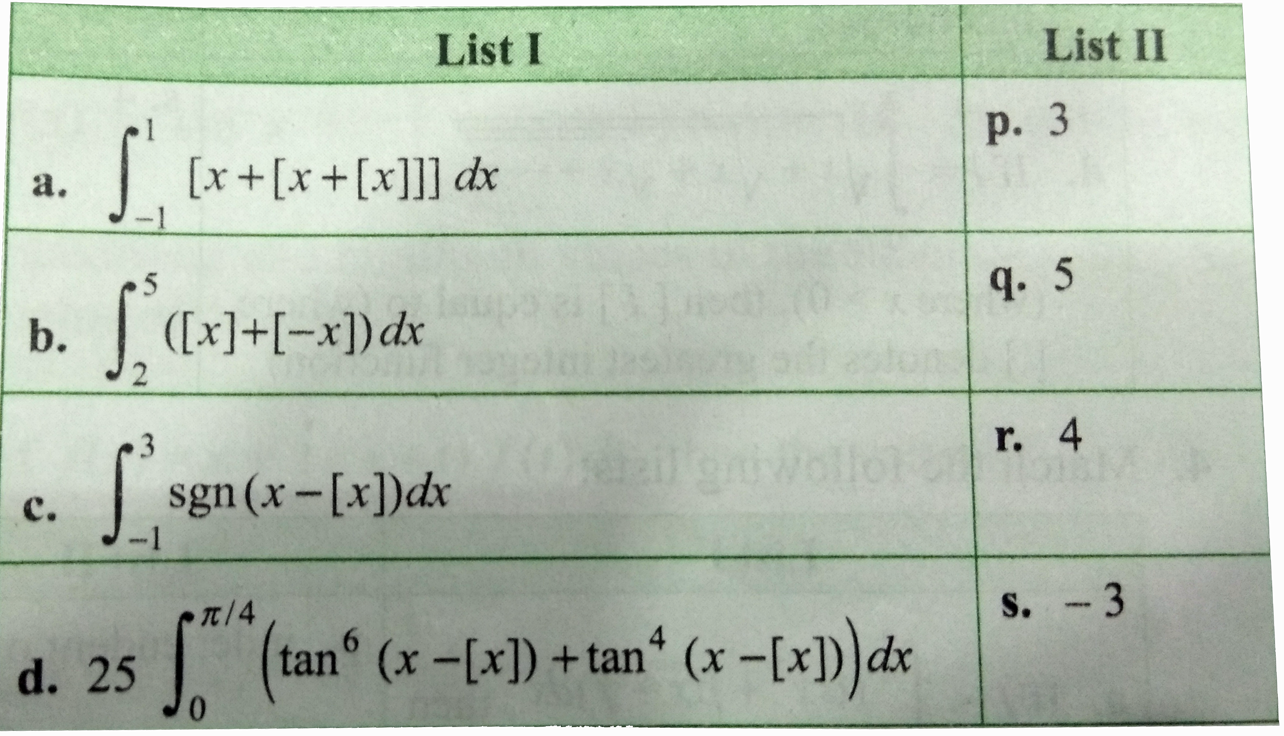Letf:[1,∞)→Randf(x)=∫x1ettdt−ex.ThenSolution in Bengali
f(x) is an increasing function
limx→∞f(x)→∞
f'(x) has a maxima at x=e
f(x) is a decreasing function
The correct Answer is:A, B
f(x)=x∫x1ettdt−ex
∴f'(x)=xexx+∫x1ettdt−ex
=∫x1ettdt>0[∵xε[1,∞)]
Thus f(x) is an increasing function.
Topper's Solved these Questions
- DEFINITE INTEGRATION BOOK - CENGAGE PUBLICATIONCHAPTER - DEFINITE INTEGRATION EXERCISE - LC_TYPE
31 Videos
- DEFINITE INTEGRATION BOOK - CENGAGE PUBLICATIONCHAPTER - DEFINITE INTEGRATION EXERCISE - MATRIX MATCH_TYPE
6 Videos
- DEFINITE INTEGRATION BOOK - CENGAGE PUBLICATIONCHAPTER - DEFINITE INTEGRATION EXERCISE - SCQ_TYPE
113 Videos
- CURVE TRACINGBOOK - CENGAGE PUBLICATIONCHAPTER - CURVE TRACINGEXERCISE - EXERCISES
24 Videos
- DETERMINANTBOOK - CENGAGE PUBLICATIONCHAPTER - DETERMINANTEXERCISE - Multiple Correct Answer
5 Videos
Similar Questions
y=f(x) satisfies the relation ∫x2f(t)dt=x22+∫2xt2f(t)dt
The range of y=f(x) is (a) [0,∞) (b)R (c)(−∞,0] (d) [−12,12]
View SolutionIf [.] denotes the greatest integer function, then match the following lists:

View SolutionLet f(x)=limn→∞1n((x+1n)2+(x+2n)2+……….+(x+n−1n)2)
Then the minimum value of f(x) is
View SolutionFind the derivative of y=sin2x−cosx
View SolutionIf x∈R,ai,bi,ci∈R for i=1,2,3 and ∣∣ ∣∣a1+b1xa1x+b1c1a2+b2xa2x+b2c2a3+b3xa3x+b3c3∣∣ ∣∣=0, then which of the following may be true ?
View SolutionIf L=(lim)x→∞logxn−[x][x], where n∈N, then−2L=
View Solutionf(x)=∫x1tan−1(t)tdt ∀x∈R+, then find the value of f(e2)−f(1e2)
View SolutionIff(x)=∫x1logt1+t+t2dx∀x≤1,thenprovethatf(x)=f(1x).
View SolutionFor x>0,letf(x)=∫x1logt1+tdt. Find the function f(x)+f(1x) and find the value of f(e)+f(1e).
View SolutionLet f:R→(0,∞) be a real valued function satisfying ∫x0tf(x−t)dt=e2x−1 then find f(x) ?
View SolutionFor x>0,letf(x)=∫x1logt1+tdt. Find the function f(x)+f(1x) and find the value of f(e)+f(1e).
View Solutionf(x)=∫x1tan−1(t)tdt∀x∈R+,thenf∈dthevalueof f(e2)−f(1e2)
View SolutionLetf:[1,∞)→Randf(x)=∫x1ettdt−ex.Then f(x) is an increasing function limx→∞f(x)→∞ f′(x) has a maxima at x=e f(x) is a decreasing function
View Solutionf(x)=∫x1lnt1+tdt,f(e)+f(1e)=
View SolutionThe point of extremum of the function phi (x) = int_1^(x) e^(t^(2)/2) (1-t^(2)) dt are
View SolutionLet function F be defined as f(x)=∫x1ettdtx>0 then the value of the integral ∫11ett+adt where a>0 is
View Solution
